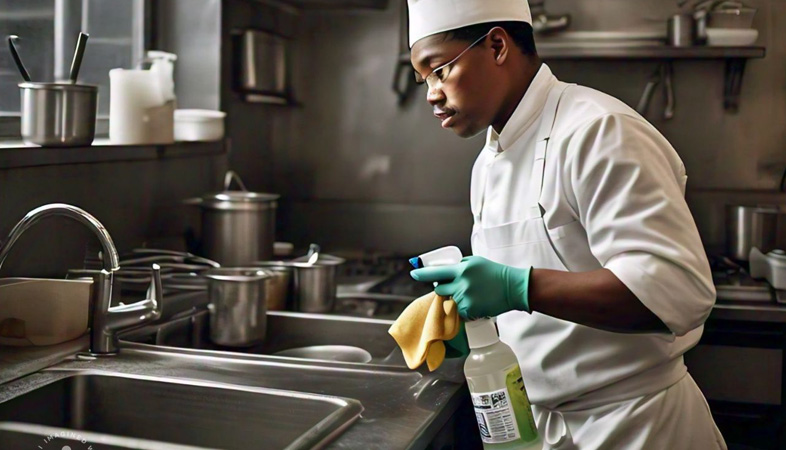How to Train Kitchen Stewards for Maximum Efficiency and Hygiene
Given the high-pressure environment of a kitchen, training kitchen stewards effectively is crucial to maintaining smooth operations.
In any commercial kitchen, kitchen stewards play a pivotal
role in maintaining cleanliness, hygiene, and efficiency. They are responsible
for ensuring that the kitchen, its equipment, and utensils are spotless,
organized, and safe for food preparation. Given the high-pressure environment
of a kitchen, training kitchen stewards effectively is crucial to maintaining
smooth operations. Proper training not only ensures hygiene standards are met
but also optimizes workflow and reduces downtime. Here are some key strategies
for training kitchen stewards to achieve maximum efficiency and hygiene.
One of the first steps in training kitchen stewards is emphasizing the importance of hygiene and cleanliness. Hygiene is the cornerstone of any food establishment, and stewards must understand the critical role they play in food safety. The training should cover essential cleaning protocols such as the proper use of sanitizing chemicals, washing techniques, and the importance of cleaning surfaces, equipment, and utensils regularly to avoid cross-contamination. They should be educated on the importance of personal hygiene as well, including proper handwashing techniques, wearing appropriate attire, and maintaining a clean workspace.
The next step is to ensure that kitchen stewards are trained in proper cleaning techniques. They should be familiar with cleaning each item and surface in the kitchen, understanding the best methods for different materials (such as stainless steel, ceramic, or glass). For example, learning how to clean ovens, fryers, and dishwashers safely and effectively without damaging the equipment is vital. Similarly, training should include the use of cleaning agents: which ones are safe for different surfaces, how to mix them, and the safety precautions necessary when handling them. With the right techniques, stewards can not only maintain cleanliness but also prolong the life of expensive kitchen equipment.
Efficiency is another critical aspect of kitchen stewarding. In the high-pressure environment of a kitchen, time is of the essence, and kitchen stewards must be able to clean and maintain the kitchen quickly without compromising on quality. To enhance efficiency, stewards should be trained in time management and the prioritization of tasks. For instance, cleaning tasks should be assigned based on the flow of operations in the kitchen. High-traffic areas, like countertops or cutting boards, need frequent cleaning during busy hours, while less frequently used areas, like storage rooms or pantries, can be cleaned during lulls in service.
An essential part of efficient kitchen stewarding is understanding how to organize the workspace. Proper organization allows stewards to work more quickly and reduces the risk of accidents or inefficiency. Training should include how to set up and maintain an organized dishwashing area, how to store cleaning supplies, and how to ensure that tools and equipment are always within reach. Stewards should also be trained on how to dispose of waste properly, segregating waste materials like organic food scraps, plastics, and glass to ensure the area remains tidy and safe.
Another important aspect of training kitchen stewards is the maintenance and care of kitchen equipment. Stewards should be taught how to operate dishwashers, fryers, ovens, and other machinery safely and effectively. They need to understand the importance of regular checks and cleaning of equipment, as even small issues like grease buildup or mineral deposits can impair equipment performance. Training on preventative maintenance helps ensure equipment runs smoothly, reducing the likelihood of breakdowns and ensuring the kitchen operates at maximum efficiency.
To keep up with industry standards, it is important to train kitchen stewards on health and safety regulations. This includes understanding local food safety laws, proper waste disposal methods, and the significance of maintaining sanitation certification. By being up-to-date on the latest hygiene regulations, stewards ensure that the kitchen not only operates safely but also avoids fines and penalties that could result from non-compliance. Regular refresher training on these standards is necessary to ensure all staff are always following the most current guidelines.
Training should also include soft skills like communication and teamwork. Kitchen stewards must be able to communicate effectively with chefs and kitchen staff to understand their needs and provide timely cleaning services. As part of a larger team, stewards must work in sync with other members to ensure that the kitchen runs smoothly. A team-oriented attitude helps to foster a positive working environment, which is critical in the high-stress setting of a kitchen.
Training kitchen stewards effectively requires a balance of technical knowledge, hands-on skills, and an understanding of the importance of hygiene and efficiency. By emphasizing the significance of cleanliness, teaching proper techniques, focusing on time management, and fostering teamwork, kitchen stewards can contribute significantly to the smooth functioning of a kitchen. A well-trained team of stewards not only ensures hygiene standards are met but also enhances overall kitchen productivity, making it an indispensable part of any food establishment.
.png)





























